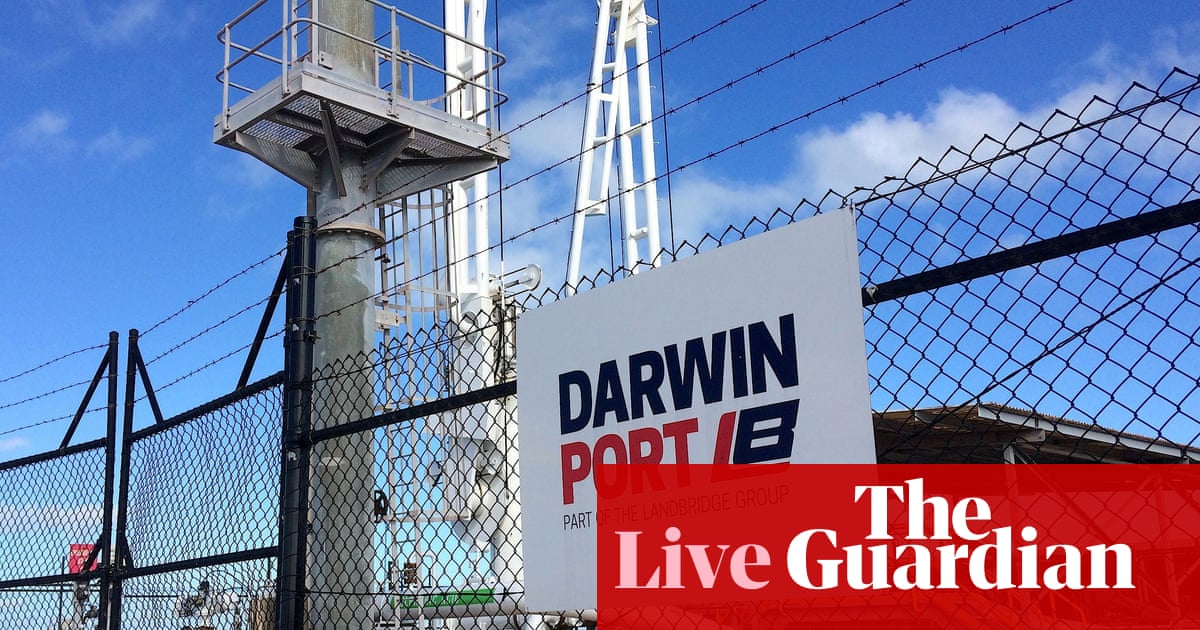Marles on Darwin Port: Labor's Next Move – A Deep Dive
Editor’s Note: Concerns regarding the Chinese lease of the Darwin Port have intensified. This article analyzes Defence Minister Richard Marles' recent statements and explores the potential ramifications for Australia's national security.
Why This Matters: Darwin Port and Australia's National Security
The controversial 99-year lease of the strategically vital Darwin Port to a Chinese company, Landbridge Group, continues to be a focal point of national debate. This issue directly impacts Australia's national security, economic interests, and its relationship with key allies. This article examines Defence Minister Richard Marles' recent pronouncements on the matter and delves into the possible courses of action the Labor government might take. Understanding the government's approach is crucial for anyone interested in Australian politics, defense strategy, and international relations.
Key Takeaways
| Point | Summary |
|---|---|
| Marles' Stance | Minister Marles has expressed concerns and is actively reviewing the situation. |
| National Security Risks | The lease raises concerns about potential Chinese influence over critical infrastructure. |
| Potential Government Actions | Options include negotiations, legislative changes, or even potential buyouts. |
| Geopolitical Implications | This situation has broad implications for Australia's relationship with China and the US. |
| Economic Considerations | Balancing national security with the economic impacts of any government action is key. |
Marles on Darwin Port: A Critical Analysis
The Darwin Port lease, signed under the previous government, has become a significant point of contention. Its strategic location near key military installations and its role in facilitating defense supplies make it a critical asset. Minister Marles' recent statements indicate a serious review of the situation, recognizing the potential security implications. The government is grappling with the challenge of balancing national security priorities with existing contractual obligations.
Key Aspects of the Darwin Port Situation
- Strategic Location: The port's proximity to key military bases and its role in supporting defense operations make it a sensitive asset.
- National Security Concerns: The Chinese ownership raises concerns about potential espionage, data breaches, and influence over critical infrastructure.
- Contractual Obligations: Understanding the legal ramifications and contractual obligations related to the lease is crucial for any government action.
- International Relations: This situation impacts Australia's relationships with China, the United States, and other key allies.
Detailed Analysis of Potential Government Responses
Several options are open to the Labor government, each with its own set of advantages and disadvantages:
- Negotiation: Attempting to renegotiate terms with Landbridge or finding a way to mitigate the security risks through contractual amendments.
- Legislative Changes: Introducing new legislation to enhance oversight of foreign ownership of critical infrastructure.
- Government Buyout: The government could potentially exercise the right to purchase the lease, although this would have significant financial implications.
Interactive Elements
National Security Risks: A Deeper Dive
The lease of the Darwin Port to Landbridge presents several facets of national security risk:
- Espionage: The potential for covert surveillance and data collection by Chinese entities.
- Cybersecurity: The risk of cyberattacks targeting the port's infrastructure and data systems.
- Supply Chain Disruption: Potential for disruption of defense supplies or other essential goods.
- Influence and Leverage: Concerns about Chinese leverage over Australia's defense capabilities and strategic positioning.
- Mitigations: Implementing robust cybersecurity measures, stricter oversight, and enhanced intelligence gathering are crucial mitigations.
The Geopolitical Landscape
The Darwin Port situation is inextricably linked to the broader geopolitical context. The evolving relationship between Australia, China, and the United States significantly influences the government's response. Maintaining strong alliances while addressing national security concerns requires careful navigation.
People Also Ask (NLP-Friendly Answers)
Q1: What is the Darwin Port controversy?
A: The controversy surrounds a 99-year lease of the strategically important Darwin Port to a Chinese company, raising concerns about national security.
Q2: Why is the Darwin Port lease important?
A: The port's location near military bases and its role in defense logistics make it a critical asset. Foreign ownership raises security concerns.
Q3: How can this affect me?
A: The situation impacts national security, potentially affecting trade, defense preparedness, and Australia's relationships with other nations.
Q4: What are the main challenges with the lease?
A: The main challenges include potential Chinese influence, cybersecurity risks, and balancing national security with contractual obligations.
Q5: What is the government doing?
A: The Labor government is actively reviewing the situation and considering options such as negotiation, legislation, or a buyout.
Practical Tips for Understanding the Darwin Port Issue
- Follow reputable news sources: Stay informed by reading credible news outlets for accurate updates.
- Understand the strategic location: Research the port's importance to defense and trade.
- Learn about the contractual terms: Examine the specifics of the lease agreement.
- Consider the geopolitical context: Understand Australia's relationship with China and other key allies.
- Follow Minister Marles' statements: Keep track of official government announcements and policy updates.
- Engage in informed discussion: Participate in discussions with an understanding of the different viewpoints.
- Support independent analysis: Seek out expert commentary and in-depth analysis of the situation.
- Contact your elected officials: Express your concerns and opinions to your representatives.
Summary: The Darwin Port lease remains a significant challenge for the Australian government. Minister Marles' involvement signifies a serious commitment to addressing the national security implications. The government’s response will have far-reaching consequences for Australia's foreign policy and national defense.
Closing Message: The Darwin Port situation highlights the complexities of balancing economic interests with national security in an increasingly interconnected world. What approach do you believe is best for Australia?
Call to Action: Share this article to raise awareness and join the conversation on this critical issue. Subscribe to our newsletter for updates on Australian politics and defense news.
(Hreflang tags would be added here, specific to the target languages and regions)

